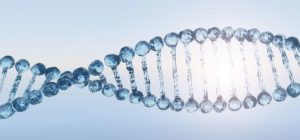Estrogen deficiency can lead to some troublesome symptoms in women. Read on to learn more about it.
RELATED: What Foods Are High In Estrogen?
In this article:
- What Is Estrogen?
- Why Is Estrogen Important for Women?
- What Are the Symptoms of Estrogen Deficiency?
- What Causes Estrogen Deficiency?
- Who Are at Risk for Estrogen Deficiency?
- How Is Estrogen Deficiency Diagnosed?
- What Are the Treatment Options for Estrogen Deficiency?
- How Can You Increase Estrogen Naturally?
- Can Low Estrogen Cause Weight Gain?
Important Estrogen Deficiency Questions Answered
What Is Estrogen?
Estrogen is the primary female sex hormone, but men also have it in smaller quantities. In women, estrogen is primarily produced in the ovaries.
Why Is Estrogen Important for Women?
Estrogen plays a role in the following functions in the female body:
- Stimulates the development of secondary sex characteristics during puberty
- Regulates the menstrual cycle
- Helps the body transition for pregnancy by ushering in changes in the uterus and breasts
- Regulates bone metabolism
- Promotes cardiovascular health by regulating cholesterol production in the liver
- Helps control body weight by regulating appetite and increasing insulin sensitivity during puberty
- Helps regulate glucose metabolism
Estrogen plays a vital role in maintaining a woman’s health. So when estrogen levels are below normal, it may lead to bothersome symptoms.
What Are the Symptoms of Estrogen Deficiency?
Here are the common symptoms of estrogen deficiency:
- Vaginal dryness
- Discomfort during sex
- Irregular menstrual periods
- Increase risk for urinary tract infections
- Increase moodiness
- Breast tenderness
- Hot flashes
- More headaches or migraines
- Depression
- Poor concentration
- A decrease in bone density
- Brittle bones
- Fatigue
Long term estrogen deficiency may lead to fertility problems in women.
What Causes Estrogen Deficiency?
Women going through menopause naturally have lower levels of estrogen. Perimenopause, a transitional period leading up to menopause last for several years. It usually begins when women are 40 years old, and estrogen can begin to decline in this phase.
During this period, estrogen levels begin to decline until they reach menopause. Menopause begins once a woman’s ovaries no longer produce estrogen.
For various reasons, non-menopausal women can also develop estrogen deficiency. Here are some of the causes of estrogen deficiency in young women:
- Problems with ovaries – Estrogen is primarily produced in the ovaries, so any form of ovarian damage may impact estrogen production.
- Too much exercising – Excessive physical activity can lead to a decrease in sex hormones.
- Eating disorders – Nutritional deficiencies can lead to endocrine dysregulation. As a result, it may have an impact on estrogen levels.
- Underactive pituitary gland – The pituitary gland plays a vital role in the endocrine system. It helps regulate hormones, so an underactive gland can also impact estrogen levels.
- Turner syndrome – This is a female chromosomal condition where the ovaries stop functioning.
- Kidney disease – Kidney disease can result in ovarian dysfunction in women.
RELATED: What Is Estrogen Dominance And What To Do About It?
Who Are at Risk for Estrogen Deficiency?
Estrogen naturally declines as women get older. But apart from age, here are the common risk factors for estrogen deficiency:
- A genetic predisposition for hormonal issues (ex: ovarian cysts or issues with the pituitary gland)
- Poor diet and nutrition
- Eating disorders
- Long-term excessive exercise
How Is Estrogen Deficiency Diagnosed?
If you’ve been experiencing some of the symptoms of estrogen deficiency, it’s best to talk to a health professional. An estrogen deficiency diagnosis usually entails:
- Personal health history
- Physical exam
- Blood tests
Aside from these, doctors may also request for brain computed tomography (CT) or DNA tests to check for endocrine issues.
What Are the Treatment Options for Estrogen Deficiency?
Estrogen deficiency is usually treated in two ways:
- Estrogen therapy – Oral, topical, and vaginal are the most common forms and may be prescribed to increase estrogen levels.
- Hormone replacement therapy (HRT) – Apart from estrogen, HRT works to increase progesterone levels as well.
It’s important to note that there may be risks.
Long-term synthetic hormone replacement may increase the risk of serious health conditions. Estrogen therapy may increase the risk of endometrial cancer.
Synthetic HRT may also increase the risk of breast cancer and cardiovascular diseases such as stroke and blood clotting.
How Can You Increase Estrogen Naturally?
If you want to increase estrogen naturally, you can try incorporating these in your diet:
- Flax seeds, sesame seeds, and soybeans (like tofu) – These foods are rich in phytoestrogens which help in estrogen metabolism.
- B vitamins – These vitamins help create and activate estrogen.
- Vitamin D – This vitamin plays a role in estrogen synthesis.
- Dehydroepiandrosterone (DHEA) – This is a hormone that can convert into estrogen.
- Boron – This is a necessary mineral for estrogen metabolism.
A supplement is an easy way to get your daily dose of these vitamins and minerals. Make sure to talk to a health professional before you try any new treatment.
Can Low Estrogen Cause Weight Gain?
Estrogen helps regulate appetite and glucose metabolism, so low levels of estrogen may result in weight gain. This can become problematic in the long run because weight gain can increase the risk of heart disease and diabetes.
Estrogen is an important hormone and plays a vital role in your overall health. If you’re exhibiting any signs of estrogen deficiency, talk to a health professional today.
Are you familiar with any of the estrogen deficiency symptoms? Share your experiences with us in the comments section below.
Up Next:
- What Happens When Estrogen Levels Are High?
- The Estrogen Family: Estrone, Estradiol, Estriol
- Easy Self-Care Checklist To Nurture Your Body, Mind, And Soul



